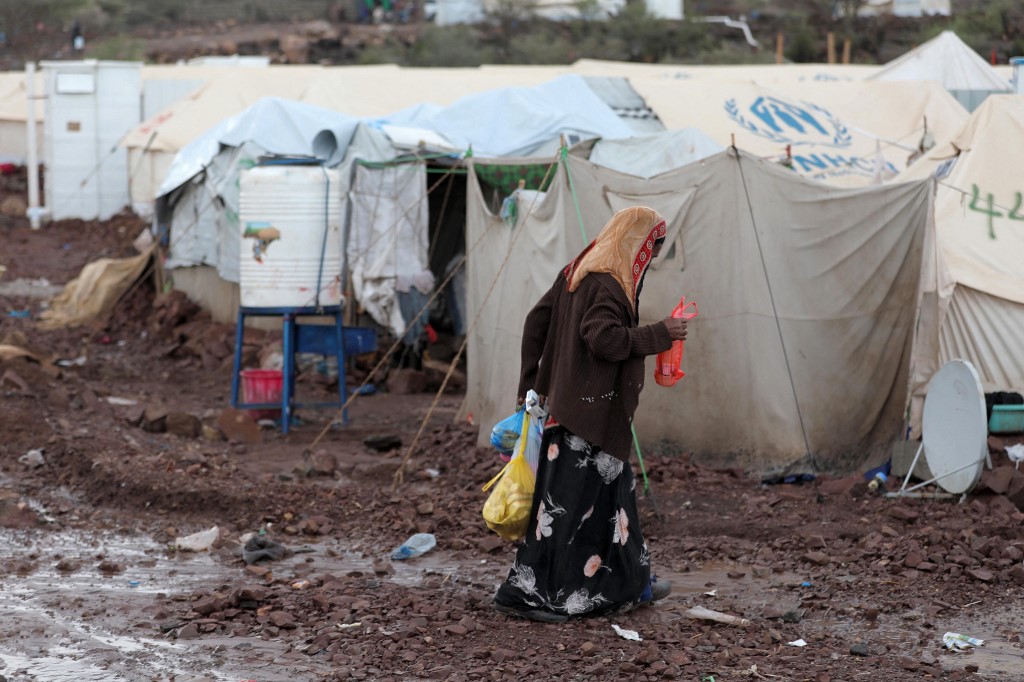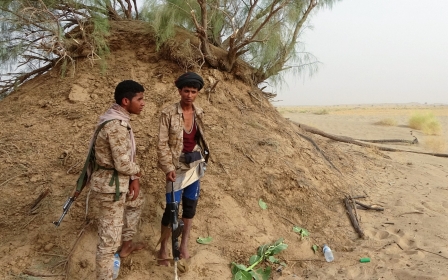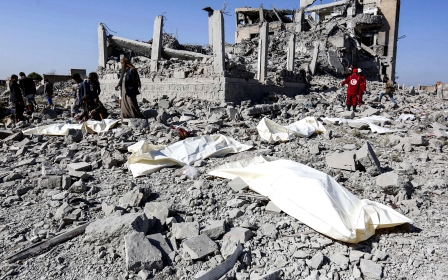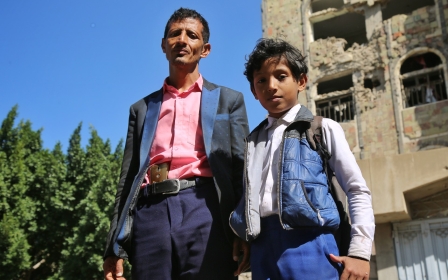Fleeing Yemen's war? You might have your home confiscated
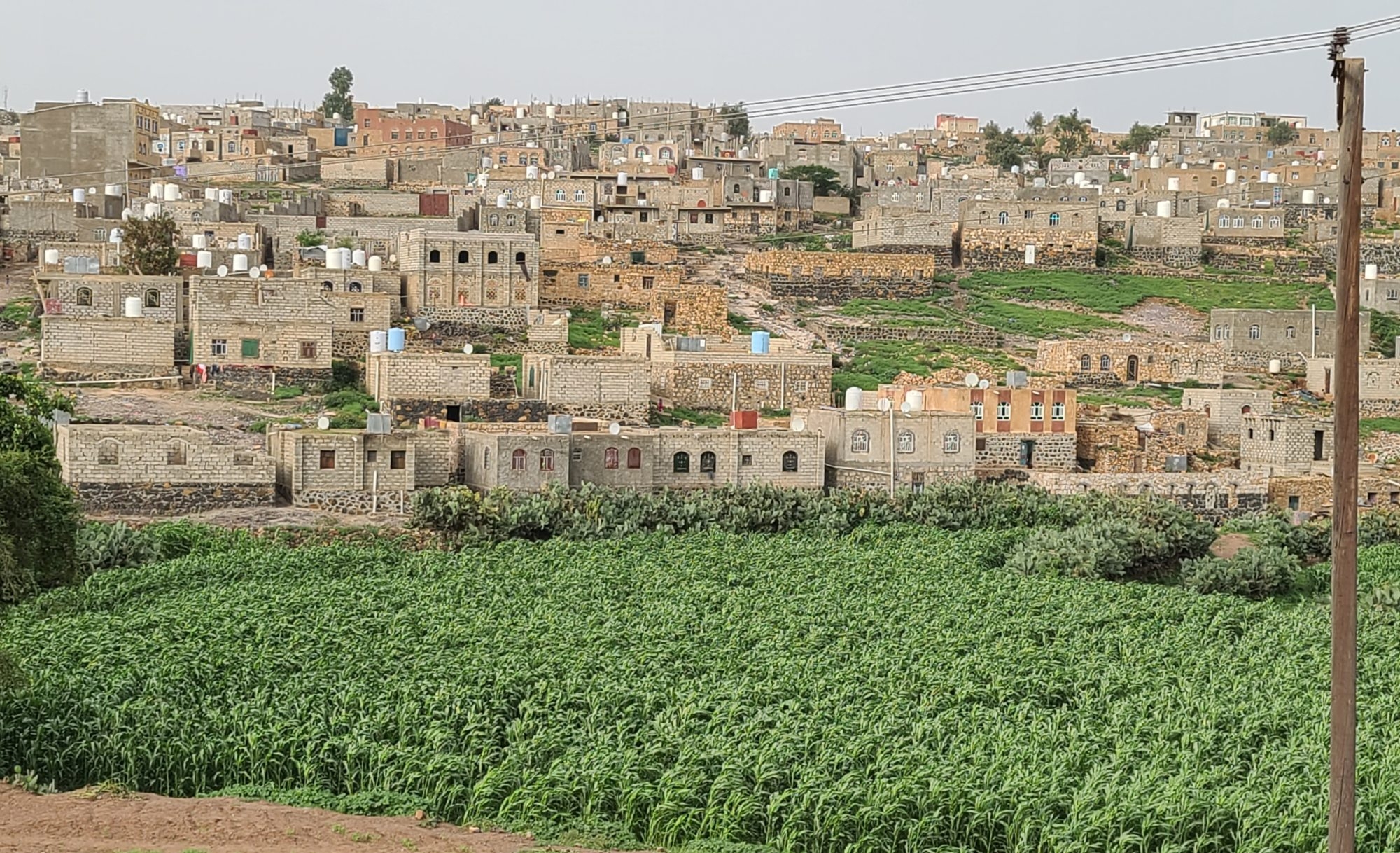
It was around 11:30 am when Yemeni security forces arrived in their military vehicles with some workers and started to destroy the fence around Amin’s property in Taiz’s al-Shimayateen district.
Amin, who lives in Yemen’s Houthi rebel-controlled capital Sanaa, bought the land in 1987, and it was due to his absence, he was told, that the authorities in Taiz decided to confiscate it.
Taiz was at the centre of a protracted battle between the Houthis and the UN-recognised government and its allies from 2015 to 2018, until pro-government forces repelled the rebels from the city. Since then there has been a stalemate.
'If armed gangs don’t loot it, the endowments office will confiscate it'
- Faiz Saeed, lawyer
“When relatives in Taiz called me to tell me about what was happening, I couldn’t believe it. This is my land and it is far from conflict zones so I couldn’t understand what has happened,” he told Middle East Eye.
“I sent a relative to ask the security forces but they shouted at him, telling him that this is public land and they have already rented it to someone else.”
New MEE newsletter: Jerusalem Dispatch
Sign up to get the latest insights and analysis on Israel-Palestine, alongside Turkey Unpacked and other MEE newsletters
Amin asked for his real name not to be published out of fear that the authorities would appropriate the rest of his lands.
Following the seizure on 2 January, Amin sent a lawyer to speak with Taiz security forces. He found that his land was confiscated by the local office of the Yemeni government's Ministry of Endowments and Guidance, which is responsible for government properties, because he no longer lives in Taiz.
“I can’t face the authorities. I’ve heard that armed gangs loot lands but this is the first time I hear that authorities confiscate land owned by civilians because they are absent from Taiz.”
Amin has legal documents proving his ownership of the property but, he said, “documents cannot help me get my land back.
“Armed gangs are only workers of the officials and military leaders in Taiz and thugs can’t do anything without a green light from authorities,” he added.
“It is the authorities who confiscate people’s lands and divide it between military and political leaders.”
Amin is one of thousands whose properties have been confiscated by authorities in Taiz, a practice that started in Taiz city in 2016 and expanded to other areas of the province in 2021, especially in al-Shimayateen district.
But while Amin still has a house and other lands in Taiz, many no longer have homes in the southwestern province.
Confiscating homes
One of the properties confiscated by Taiz authorities is the home of a famous Yemeni writer, Jamal al-Sheri.
Sheri’s house, along with others in his neighbourhood, is now under the control of a pro-government military leader.
In 2020, Sheri said that the military leadership in Taiz refused to return his property under the pretext that it was located near a conflict zone, which the writer disputed, saying there were no frontlines nearby.
Sheri said that he had received threats from military leaders because of his demands to get his house back.
That same year, Mohammed Mahdi returned to Taiz from Saudi Arabia, where he was living at the time, to demand that his home, which had been seized by the military, be returned to him.
Mahdi spent six months fighting for his rights to ownership before he was killed near his home in late August. His death caused widespread anger in Taiz, with people accusing members of the 17th Infantry Brigade of being behind the killing, but the military denied involvement.
“I’d rather leave my home to the military leaders and authorities than sacrifice myself demanding it,” Marwan, a resident in Taiz city who refused to use his real name for security reasons, told MEE.
Following the government capture of Marwan’s neighbourhood from the Houthis in 2016, authorities seized his home after he had left Taiz to Ibb province. Upon his return, Marwan discovered that the military leaders who manage the province now control his property.
“My enemy is the authorities, so who is going to help me?” he said.
“Definitely no one dares to complain against the authorities, and some of those who did were either killed or at least lost their money to mediators without any results.”
Marwan said he does not want to meet the same fate as some of his neighbours who demanded their homes back and were sent to jail.
Marwan is unemployed and can barely afford to pay rent for the small house he lives in.
“I pray to God every day to help me and all the other oppressed people in Taiz get our homes back from the hands of the authorities.”
Sell it to thugs
Mohammed Ahmed, 58, a Yemeni expat in Saudi Arabia, has properties in Taiz’s al-Shimayateen district, and, for a while, refused to believe that someone would take the land he bought around 30 years ago.
“Everything is possible in Taiz as it is thugs and criminals who manage the province, while the governor is outside Yemen and is not aware about what happens there,” he told MEE.
'I’d rather leave my home to the military leaders and authorities than sacrifice myself demanding it'
- Marwan, Taiz resident
“Six months ago, the endowments office confiscated some lands belonging to my relatives, and when they were about to take mine, I resorted to selling it to thugs for a cheap price since authorities cannot face thugs.”
Ahmed had no other choice but to sell his land to the thugs because, he said, not only are they part of the government, but they are the ones who actually control the province.
Faiz Saeed, a lawyer in Taiz province, confirmed that the endowments office in al-Shimayateen has confiscated many lands, saying the district had received a large number of displaced families fleeing conflict zones in the country, which has dramatically increased land prices.
“Those who aren’t in Taiz and don’t have someone to protect their properties in al-Shimayateen district are better off selling what they have,” he told MEE.
“If armed gangs don’t loot it, the endowments office will confiscate it.”
Public properties
Muneer al-Masani, the manager of the endowments office in al-Shimayateen claimed that it does not loot people’s land, but instead they recapture stolen lands.
“Those lands used to belong to the endowments office hundreds of years ago but they were sold by people hundreds or dozens of years ago,” Masani told MEE.
“People believe those are their lands but they are public lands.
“We are now recapturing endowment lands that were sold. Even if people have documents and they have been using those lands for dozens or hundreds of years, they are still endowment lands.”
'People believe those are their lands but they are public lands'
- Muneer al-Masani, Taiz endowments office
Masani said that they now rent the lands to new tenants for annual fees, threatening to face anyone who stands in the way of the endowments office and the authorities.
He didn’t give any figures about the properties the authorities have confiscated, but he said many were seized and they will continue to confiscate more in coming months.
Amin, the man whose land was confiscated by the endowments office, said that he has all the documents that prove his ownership of the land and he built the fence around it 25 years ago.
“If the endowments office has [ownership] documents for my land, they should go to court and raise a complaint, and I can send a lawyer on my behalf,” Amin said.
“They shouldn’t head directly to destroy my fence and rent it to another.”
Middle East Eye delivers independent and unrivalled coverage and analysis of the Middle East, North Africa and beyond. To learn more about republishing this content and the associated fees, please fill out this form. More about MEE can be found here.


